European Parliament President Antonio Tajani has commented on the current situation in Libya, specifically dwelling on Italian Interior Minister Matteo Salvini’s claims that the economic interests of a foreign country could be behind the military operation being launched against the Libyan capital Tripoli.
“We have always said that France and Italy have separate interests in Libya, so much so, that Sarkozy was one of the strong supporters of overthrowing and then killing Muammar Gaddafi, along with the Americans and the British,” Tajani told the Italian news network Sky TG24.
He argued that “France made a dramatic historical mistake” in hoping for a stronger presence in Libya, but that at the end of the day, "there is nothing but chaos and we have paid the price through the continuing migration flows”.
He warned that if no efforts are taken right now to resolve the Libyan crisis, the situation in the country “will become unmanageable”. According to Tajani, the Libyan standoff “also reflects Italy’s inability” to be in charge of the situation in the North African country.
Tajani’s comments came after Italian Interior Minister Matteo Salvini argued that the economic interests of a foreign country could be behind the military operation which was recently launched against the Libyan capital Tripoli.
The escalating crisis in Libya started to unravel last Thursday when the Libyan National Army (LNA) of Field Marshal Khalifa Haftar marched on the national capital with the stated goal of wrestling it from alleged “terrorists".
Forces loyal to the Tripoli-based and UN-supported Government of National Accord (GNA) said, in turn, that they were launching a counteroffensive operation dubbed Volcano of Rage.
On Tuesday, the GNA’s Presidential Council condemned the LNA airstrikes on Mitiga Airport in Tripoli, slamming them as “a war crime and a crime against humanity, which is violating all national laws and international agreements and which made sending ill and wounded people to hospitals impossible at this difficult moment”.
Libya has been embroiled in a severe political crisis since National Transitional Council forces, supported by NATO, murdered the country's former head Muammar Gaddafi in October 2011.
The country was then divided between the parliament, which was elected in 2014 and is based in the city of Tobruk and supported by the LNA, and the GNA, which was formed at the UN's initiative and controls the western part of the country, including the capital Tripoli.

